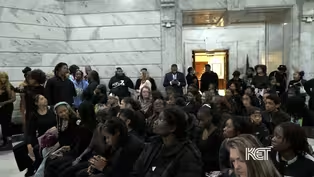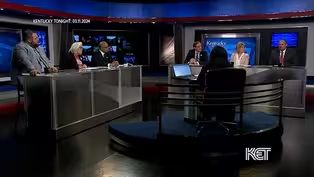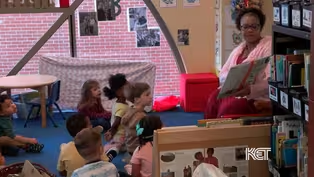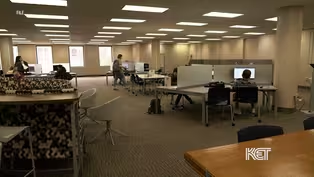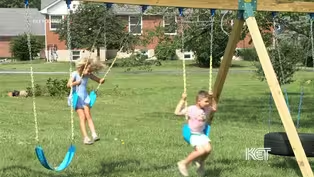
Funding AEDs
Clip: Season 2 Episode 204 | 4m 2sVideo has Closed Captions
An update to a law could fund AEDs in more public school buildings in Kentucky.
House Bill 169 would put A-E-Ds in all public school buildings and establishes a trust fund provision to help schools purchase A-E-Ds. The trust would accept funds from the state or donations.
Problems playing video? | Closed Captioning Feedback
Problems playing video? | Closed Captioning Feedback
Kentucky Edition is a local public television program presented by KET

Funding AEDs
Clip: Season 2 Episode 204 | 4m 2sVideo has Closed Captions
House Bill 169 would put A-E-Ds in all public school buildings and establishes a trust fund provision to help schools purchase A-E-Ds. The trust would accept funds from the state or donations.
Problems playing video? | Closed Captioning Feedback
How to Watch Kentucky Edition
Kentucky Edition is available to stream on pbs.org and the free PBS App, available on iPhone, Apple TV, Android TV, Android smartphones, Amazon Fire TV, Amazon Fire Tablet, Roku, Samsung Smart TV, and Vizio.
Providing Support for PBS.org
Learn Moreabout PBS online sponsorshipA law passed last year requiring portable automated external defibrillators or a aeds and all public, middle and high schools in Kentucky could be getting an update.
Republican state Representative Kimberly Moser and Democratic State Representative Ruth Ann Palombo collaborated on this measure.
This session they introduced House Bill 169.
It would put ads in all public school buildings and establishes a trust fund provision to help schools purchase.
The trust would accept funds from the state or donations.
Among those voicing support for the bill in Frankfurt Monday, a young heart attack survivor and a family whose teenage son died after going into sudden cardiac arrest.
Their message to lawmakers of what can possibly be more important than saving a life.
A 14 year old student sitting in math class falls to the floor, unresponsive.
A 16 year old high school basketball player collapses on the court after making the game winning shot.
Sudden cardiac arrest is rare in young people.
But it can happen.
Our older son, Matthew, was a junior in high school and on June 16th of 2020 passed away of a sudden cardiac arrest in soccer practice.
Towards the end of practice during a sprint, he collapsed on campus.
That night there were five dead.
The closest one was 250 feet away, behind a locked door.
It was not brought to him and his initial shock did not come until 12 agonizing minutes after he collapsed in front of his his mother, Kim.
Unfortunately, Nancy did not survive that event.
Survival shouldn't hinge on luck and happenstance.
The presence of individuals trained in CPR and equipped with knowledge can make the difference between life and death.
It's about being prepared, taking swift action, and having the resources readily available.
My name is Levine, and my story illustrates why this funding is so important.
As I walked toward class, I began to feel my life slipping through my fingers.
My heart was pounding and indescribably uncomfortable.
Right.
And as I stumbled into my classroom, I became dizzy.
And the world was black.
I went into sudden cardiac arrest.
I died.
That day.
What you don't know is that this happened in 2011 and I was eight years old and it was my third grade classroom.
My principal hero and Angel and her step Rivera came in and found me looking a great color and saved my life through three rounds of CPR.
Saving lives is not about luck.
It's about being prepared with hands only CPR, training and AIDS.
We can all be the person who responds.
We worry about the safety of children in schools in every other way, and it is time that we are prepared for this very unfortunate, very sudden.
It's not an event that anyone can ever plan for knowing that this is going to happen, but we can certainly plan to save someone's life in that situation.
What is the cost of a child's life?
We are advocating for the Kentucky aid fund House Bill 169, not just as a budget line, but as a lifeline, one that could protect every child in our state, including yours.
I urge you to consider the gravity of what we discussed today.
It's about transforming our grief into action, ensuring that no other family endures the pain that we have faced.
Let's make our schools safer and our communities more prepared and our children more protected.
House Bill 169 passed the full House and has moved on to the Senate for further consideration.
Video has Closed Captions
Clip: S2 Ep204 | 1m 32s | Some lawmakers want to pump the brakes on self-driving vehicles and A.I. in Kentucky. (1m 32s)
Video has Closed Captions
Clip: S2 Ep204 | 3m 9s | Supporters of bill protecting natural hair style against discrimination gather at Capitol. (3m 9s)
Headlines Around Kentucky (3/12/2024)
Video has Closed Captions
Clip: S2 Ep204 | 2m 27s | Kentucky’s attorney general joins a lawsuit against the EPA. (2m 27s)
Video has Closed Captions
Clip: S2 Ep204 | 2m 51s | A panel talks about use of military veterans or retired police as school security. (2m 51s)
Video has Closed Captions
Clip: S2 Ep204 | 2m 43s | Louisville is getting free pre-K for three and four-year-olds thanks to a non-profit. (2m 43s)
Video has Closed Captions
Clip: S2 Ep204 | 1m 18s | Bill would change state funding model to better support non-traditional college students. (1m 18s)
Video has Closed Captions
Clip: S2 Ep204 | 3m 20s | Local governments could see how zoning impacts the childcare market under proposed bill. (3m 20s)
Providing Support for PBS.org
Learn Moreabout PBS online sponsorship
- News and Public Affairs

Top journalists deliver compelling original analysis of the hour's headlines.

- News and Public Affairs

FRONTLINE is investigative journalism that questions, explains and changes our world.












Support for PBS provided by:
Kentucky Edition is a local public television program presented by KET

